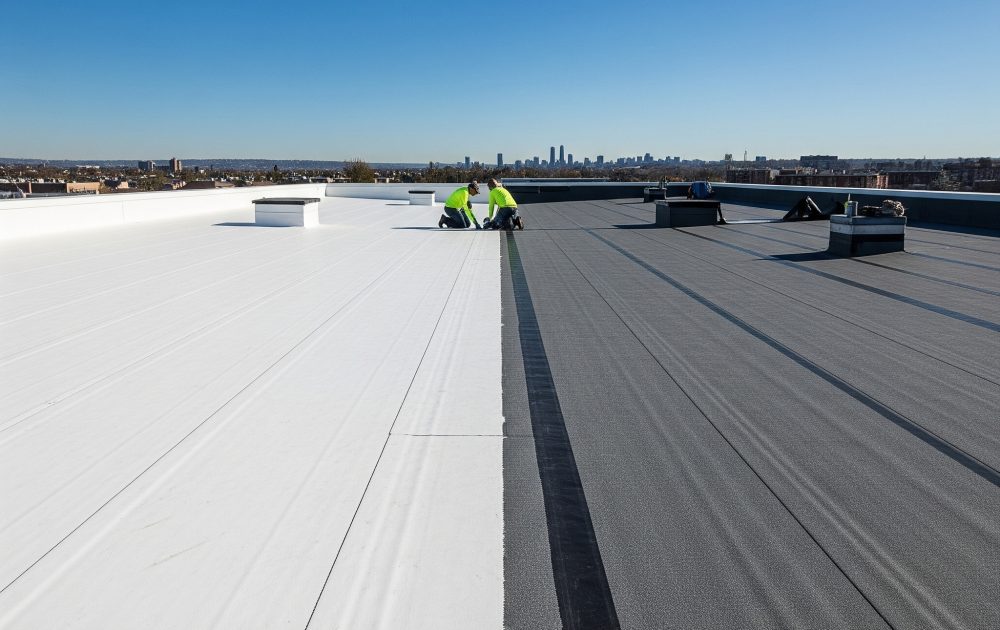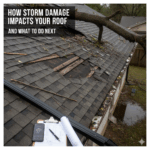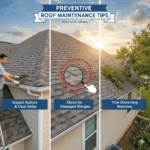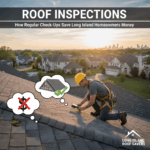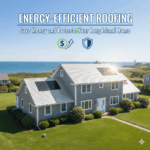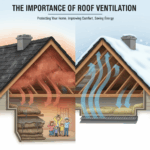Choosing the right roofing material for your commercial building is a critical decision that impacts your property’s durability, energy efficiency, and long-term maintenance costs. Among the most popular flat roofing options in Long Island are TPO (Thermoplastic Olefin) and EPDM (Ethylene Propylene Diene Monomer) roofing systems. Both materials offer unique benefits, but understanding their differences can help you make an informed choice.
At ELED Construction, we specialize in commercial roofing installations and repairs, offering expert advice tailored to your building’s needs. This guide breaks down the pros and cons of TPO and EPDM roofing to help you decide the best fit for your commercial property.
For professional consultation or a free commercial roofing estimate, call us at (631) 552 6884 or visit our free estimate page.
Understanding TPO and EPDM Roofing
Before comparing the two, let’s briefly understand what TPO and EPDM roofing materials are:
-
TPO (Thermoplastic Olefin): A single-ply roofing membrane made from a blend of polypropylene and ethylene-propylene rubber. It’s known for its heat-reflective properties, energy efficiency, and seamless installation.
-
EPDM (Ethylene Propylene Diene Monomer): A synthetic rubber roofing membrane that is highly durable, flexible, and resistant to weathering and UV rays. It is one of the oldest and most proven flat roofing materials.
1. Material Composition and Appearance
-
TPO Roofing: Typically white or light-colored, TPO membranes are designed to reflect sunlight and reduce heat absorption. This contributes to lower cooling costs in warm climates. The material is smooth and can be installed in large sheets for a clean, uniform look.
-
EPDM Roofing: Usually black or dark gray, EPDM absorbs heat, which can be advantageous in colder climates. Its surface is slightly textured or matte and is available in both fully adhered or mechanically fastened installation options.
2. Installation Process
-
TPO: TPO membranes are heat-welded at the seams, creating a strong, watertight bond. This process reduces the risk of leaks and increases the roof’s durability. Installation requires skilled technicians trained in hot-air welding techniques.
-
EPDM: EPDM roofing is typically installed using adhesives or mechanical fasteners. Seams are overlapped and sealed with tape or adhesives. While EPDM installation is generally faster and less complex, seams are considered more vulnerable to leaks compared to welded TPO.
3. Energy Efficiency
-
TPO: One of TPO’s biggest advantages is its energy efficiency. Its reflective surface can reduce cooling costs by reflecting ultraviolet (UV) rays and heat from the sun, making it ideal for commercial buildings with flat roofs in warmer areas.
-
EPDM: Because EPDM is dark-colored, it absorbs heat, which can raise cooling costs in summer but may reduce heating costs in winter. To improve energy efficiency, white or light-colored EPDM membranes are available, though they are less common and may come at a higher cost.
4. Durability and Lifespan
-
TPO: Newer to the market (introduced in the 1990s), TPO has seen improvements in formulation over time. Modern TPO roofs can last 20–30 years when properly maintained, but some older formulations experienced issues with premature degradation.
-
EPDM: EPDM has a long track record of durability, often lasting 25–30 years or more with routine maintenance. Its rubber composition is highly resistant to tears, punctures, and extreme weather conditions, making it a reliable choice for many commercial roofs.
5. Maintenance Requirements
-
TPO: Maintenance includes regular inspections to ensure weld seams remain intact and debris-free. Repairs often require specialized heat-welding equipment to restore seams or patch holes.
-
EPDM: EPDM’s rubber surface is flexible and self-healing to some extent, making it more resistant to small punctures. Repairs typically involve adhesive patches and sealants, which can be easier and less costly compared to TPO seam repairs.
6. Cost Considerations
-
TPO: Initial material and installation costs for TPO tend to be higher due to the need for professional welding and newer technology. However, its energy savings can offset costs over time.
-
EPDM: EPDM is often more affordable upfront and has a simpler installation process, making it popular among budget-conscious commercial property owners. Its long lifespan also contributes to good overall value.
7. Environmental Impact
-
TPO: TPO roofing membranes are recyclable and contribute to reducing heat island effects due to their reflective surfaces. These properties make TPO a popular choice for green building projects.
-
EPDM: EPDM roofing is also recyclable and is made from sustainable materials. Its ability to perform well in extreme temperatures reduces the need for roof replacements and waste.
Which Roofing System Is Best for Your Commercial Building?
Choose TPO if:
-
You want to reduce energy costs with a reflective roofing membrane.
-
Your commercial building is in a hot or sunny climate.
-
You prefer a modern, seamless roof with heat-welded seams.
-
You are looking for an environmentally friendly, energy-efficient option.
Choose EPDM if:
-
You seek a proven, highly durable roofing membrane.
-
Your building requires a flexible roof to withstand temperature fluctuations.
-
You want a cost-effective solution with easier repairs.
-
Your commercial property is in a cooler climate where heat absorption is beneficial.
Why Trust ELED Construction for Your Commercial Roof?
Our expert team at ELED Construction has extensive experience installing and maintaining both TPO and EPDM roofing systems across Long Island. We provide:
-
Thorough roof inspections and honest assessments
-
Customized recommendations based on your building’s needs and budget
-
Professional installation using top-quality materials
-
Reliable maintenance and repair services
We’re committed to delivering roofing solutions that protect your property and help you maximize your investment.
Schedule Your Commercial Roofing Consultation Today
Unsure which roofing system is right for your commercial property? Contact ELED Construction to discuss your options and receive a free estimate.
Call (631) 552 6884 or request your free commercial roofing estimate here.
